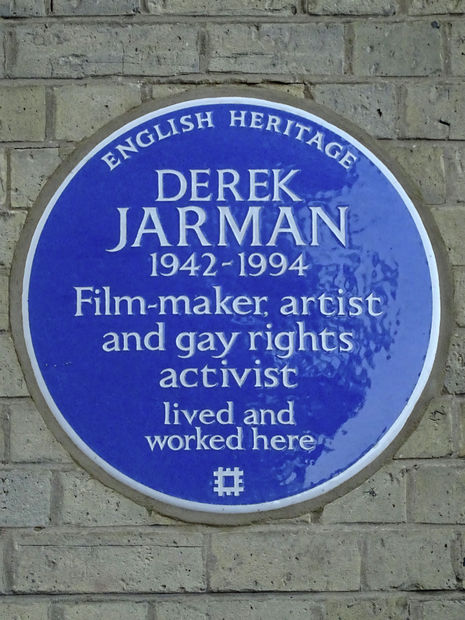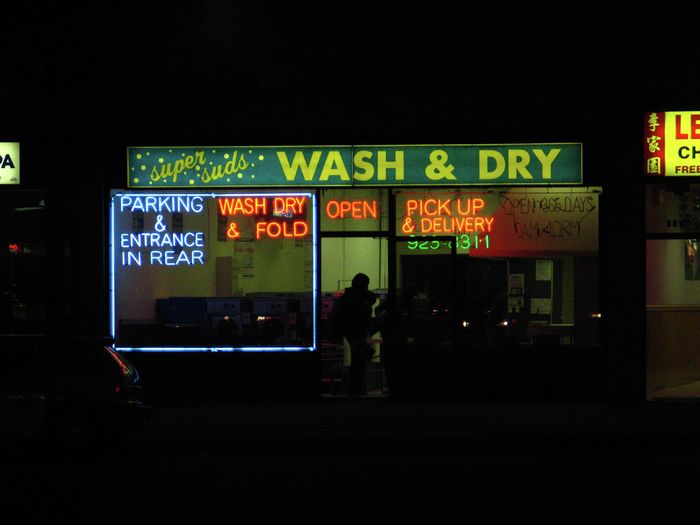Blue: A saint’s final testament, doused in monochrome
Columnist Jude Jones turns to Derek Jarman’s unique film Blue to reveal a transient joy in life

Content Note: Discussion of the HIV/AIDS crisis
One frame. One colour. Seventy-nine minutes.
Derek Jarman’s Blue (1993) is a film unlike any other. It is comprised of a single static shot of blue over which unfurls a rich ambient soundscape, courtesy of Brian Eno, and a technicolour voiceover that interweaves details of the queer artist-filmmaker’s life with ruminations on the colour blue and the on-going HIV crisis that would claim Jarman as another of its victims just three months after the film’s release. It is a moving story of mourning, suffering and loss, but also of passion, love, and hope.
“Blue is Jarman’s ode to those who would never step back out from under this shadow”
As a result of long-term complications from HIV/AIDS, Jarman would lose his ability to see. His eye-sight faltering, the world around him was doused in violent monochrome, visible only in saturated shades of blue. “I wanted to convey some of what I’d seen,” Jarman said of the film in one of his final interviews, “the disaster of which I’ve been living through of the last few years […] I hope the film sort of makes people think about that, just for a moment.” For his lifetime of activism, Jarman would be canonised as a saint by the queer protest group The Sisters of Perpetual Indulgence, a ‘counter-canonisation’ in response to Ian McKellen’s acceptance of knighthood from the same Thatcher government that had earlier promulgated Clause 28 – a law prohibiting local authorities from ‘promoting homosexuality’ – and that had systematically neglected the HIV crisis that was still razing communities like McKellen’s, like Jarman’s.

Communities: London’s perpetually vibrant queer scene, imbued with the light of Heaven but quickly sunk under the shadow of an illness formerly known as ‘the gay cancer’ and a Prime Minister who, through Section 28, codified into law queer voicelessness. Blue is Jarman’s ode to those who would never step back out from under this shadow. ‘David, Howard, Graham, Terry, Paul’: the names of Jarman’s friends and lovers already dead are repeated like mournful incantations throughout the film, interspersed between uncomfortably clinical descriptions of his own treatment in a sombre acknowledgement that he will soon join their ranks. Blue becomes the colour of mourning; Blue is the act of mourning itself.
“Blue becomes the colour of mourning; Blue is the act of mourning itself”
This hopelessness and suffering that the HIV crisis inflicted on queer communities is hard to contextualise for a generation that is thankfully, mercifully, acclimatised to PrEP and other readily-available treatments. But for Jarman’s generation such feelings were inescapable. Friends died and withered at a rate nearly impossible to fathom, the body was transformed into a fickle and treacherous vessel, sex rendered a most intimate dance with the devil. “We all contemplated suicide,” Jarman confides at one point in Blue, while the general atmosphere of these crisis years can be summarised with the dictum he inscribed in his autobiography, At Your Own Risk (1993): ‘I wouldn’t wish the eighties on anyone.’
To these cries for help, the Thatcher government replied with the mantra ‘AIDS: Don’t Die of Ignorance,’ the almost snide slogan of its nationwide HIV-prevention campaign. The moralising tone was victim-blaming 101, framing HIV as the product of personal immorality and vices rather than of government failings. Clause 28 only exacerbated the problem, preventing HIV from being raised as a queer issue in official discourse, despite its disproportionate effects on queer groups. For contemporaries, it felt almost genocidal.
“It is only through the open celebration of these acts that such narratives could be destabilised”
As an exercise in mourning and loss, Blue does not want this trauma to be forgotten. ‘I am a c*ck sucking / Straight acting / Lesbian man / With ball crushing bad manners / [and] Laddish nymphomaniac politics,’ Jarman proclaims, appropriating the rhetoric of a popular culture that demonised gay men as the perverted vectors of a mystery disease and that characterised MLM sex as a self-imposed death sentence. It’s like queer theorist Leo Bersani was left to ponder in his seminal essay: ‘is the rectum a grave?’
But Jarman equally does not want this trauma to be what defines his generation. Because, as Bersani concluded, if heteronormative narratives on HIV were legitimised by the vilification of queer sex, queer intimacy, and queer love as death-bringing, it is only through the open celebration of these acts that such narratives could be destabilised. Jarman advocated for and campaigned incessantly on safer sex and contraception rights throughout his lifetime, emphasising that sex did not have to be a flirtation with fate, an act conducted only at your own risk. The ability to openly express queerness through sex and love was what made life worth living for him; it was something that could never be taken away, even as his own death relentlessly approached. Hence the final poem he recites in Blue, an ode to a man who may very well be his final lover, his final respite in the face of the void. And then his conclusion:
“Our name will be forgotten.
In time
No one will remember our work […]
And our lives will run like
Sparks through the rubble.”
Life is transient, says Jarman. Enjoy it. Share its pleasures with others. Because one day you too will be forgotten, subsumed to the void of blue. Find peace in that: nothing that you do really matters, so why worry? ‘Lost boys / Sleep forever,’ he reminds us. Find yourself and pursue pleasure, because to fail to do so is to remain lost and never really live.
And even if life is fleeting, love is not. So go out and love. Because ‘love is life that lasts forever.’
 News / Right-wing billionaire Peter Thiel gives ‘antichrist’ lecture in Cambridge6 February 2026
News / Right-wing billionaire Peter Thiel gives ‘antichrist’ lecture in Cambridge6 February 2026 News / John’s duped into £10m overspend6 February 2026
News / John’s duped into £10m overspend6 February 2026 News / Epstein contacted Cambridge academics about research funding6 February 2026
News / Epstein contacted Cambridge academics about research funding6 February 2026 News / Man pleads guility to arson at Catz8 February 2026
News / Man pleads guility to arson at Catz8 February 2026 News / Corpus FemSoc no longer named after man6 February 2026
News / Corpus FemSoc no longer named after man6 February 2026









